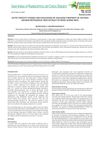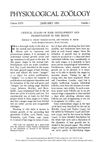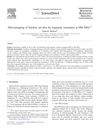January 2023 in “International Journal of Trichology” The hemp extract significantly increased hair regrowth in both men and women without any side effects.
200 citations,
August 2009 in “Experimental dermatology” Eating high-glycemic foods and drinking milk may worsen acne by increasing insulin and IGF-1 levels.
 56 citations,
March 2015 in “Journal of Investigative Dermatology”
56 citations,
March 2015 in “Journal of Investigative Dermatology” Healthy mitochondria in skin cells are essential for proper hair growth and skin cell interaction in mice.
[object Object] 44 citations,
January 2013 in “BMC Dermatology” TGFβ signaling prevents sebaceous gland cells from producing fats.
39 citations,
March 2022 in “Nature Protocols” Scientists created hair-growing skin models from stem cells, which could help treat hair loss and skin diseases.
35 citations,
January 2011 in “Journal of Biological Chemistry” sPLA2-X is crucial for normal hair growth and follicle health.
 7 citations,
February 2022 in “Stem cell reviews and reports”
7 citations,
February 2022 in “Stem cell reviews and reports” Skin cells show flexibility in healing wounds and forming tumors, with potential for treating hair disorders and chronic ulcers.
2 citations,
June 2020 in “Journal of Investigative Dermatology” 3D imaging of skin biopsies offers better accuracy but is time-consuming and can't clear melanin.
1 citations,
January 2017 in “Clinical Dermatology Review” Better education on proper hair cleansing methods is needed.
[object Object]  1 citations,
February 2020 in “Cureus”
1 citations,
February 2020 in “Cureus” Women with PCOS are more likely to have skin problems like excessive hair, acne, and hair loss.
 January 2023 in “Burns & Trauma”
January 2023 in “Burns & Trauma” The study concluded that the new wound model can be used to evaluate skin regeneration and nerve growth.
 20 citations,
January 2003 in “Journal of oleo science”
20 citations,
January 2003 in “Journal of oleo science” Chemical treatments and daily stresses damage hair, especially the cuticle layer.
 September 2019 in “Asian Journal of Pharmaceutical and Clinical Research”
September 2019 in “Asian Journal of Pharmaceutical and Clinical Research” Teak seed extract is safe and reduces pain in mice.
 829 citations,
May 2007 in “Nature”
829 citations,
May 2007 in “Nature” Hair follicles can regrow in wounded adult mouse skin using a process like embryo development.
 236 citations,
January 1951 in “Physiological zoology”
236 citations,
January 1951 in “Physiological zoology” Hair growth and pigmentation in mice involve specific stages crucial for research.
 139 citations,
February 2014 in “Journal of Advanced Research”
139 citations,
February 2014 in “Journal of Advanced Research” Vitamin D is important for skin health and may affect conditions like psoriasis and hair loss, but more research is needed to understand its role fully.
 111 citations,
March 1951 in “Annals of the New York Academy of Sciences”
111 citations,
March 1951 in “Annals of the New York Academy of Sciences” Understanding the mouse hair cycle is crucial for cancer research.
 37 citations,
September 2018 in “Journal of the American Academy of Dermatology”
37 citations,
September 2018 in “Journal of the American Academy of Dermatology” Ruxolitinib can help regrow hair in severe alopecia areata.
 31 citations,
August 1975 in “Journal of Pharmaceutical Sciences”
31 citations,
August 1975 in “Journal of Pharmaceutical Sciences” Minoxidil metabolizes similarly in monkeys and humans, but differently in dogs and rats.
 21 citations,
September 2008 in “Magnetic Resonance Imaging”
21 citations,
September 2008 in “Magnetic Resonance Imaging” MRI can effectively image skin structures noninvasively.
 19 citations,
November 2016 in “Dermatology and therapy”
19 citations,
November 2016 in “Dermatology and therapy” Stopping the medication infliximab and starting new treatments helped a woman's hair grow back and improved her scalp condition.
 15 citations,
February 2015 in “Han-gug chugsan sigpum hag-hoeji/Korean journal for food science of animal resources”
15 citations,
February 2015 in “Han-gug chugsan sigpum hag-hoeji/Korean journal for food science of animal resources” Egg shell membrane hydrolysates can reduce wrinkles and improve skin health.
 10 citations,
March 2015 in “Journal of dermatology”
10 citations,
March 2015 in “Journal of dermatology” The boy's severe skin disorder is caused by two new mutations in his TGM1 gene.
 8 citations,
January 1996 in “Springer eBooks”
8 citations,
January 1996 in “Springer eBooks” Male pattern baldness may be caused by factors like poor blood circulation, scalp tension, stress, and hormonal imbalances, but the exact causes are still unclear.
 6 citations,
August 2020 in “Journal of Pharmaceutical Innovation”
6 citations,
August 2020 in “Journal of Pharmaceutical Innovation” Nanoemulgel improves hair growth and quality using finasteride without irritation.
 4 citations,
January 1974 in “The BMJ”
4 citations,
January 1974 in “The BMJ” All medications can cause skin rashes, often without a clear cause, and better tests are needed to identify these drug-related skin issues.
 3 citations,
July 2012 in “Indian Journal of Psychological Medicine”
3 citations,
July 2012 in “Indian Journal of Psychological Medicine” Olanzapine helped a man who thought he had bugs on his skin.
 3 citations,
January 2012 in “Wageningen Academic Publishers eBooks”
3 citations,
January 2012 in “Wageningen Academic Publishers eBooks” Hair health depends on various factors and hair loss can significantly affect a person's well-being; understanding hair biology is key for creating effective hair care treatments.
 2 citations,
January 2014 in “Springer eBooks”
2 citations,
January 2014 in “Springer eBooks” The book details skin conditions in older adults, their link to mental health, cancer treatment importance, hair loss remedies, and managing autoimmune and itchy skin.
 2 citations,
May 2001 in “Current problems in dermatology”
2 citations,
May 2001 in “Current problems in dermatology” The conclusion is that effectively treating hair disorders is difficult due to the complex factors affecting hair growth and more research is needed to improve treatments.






















